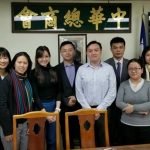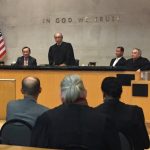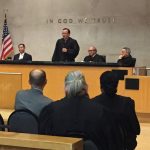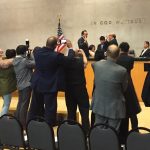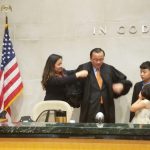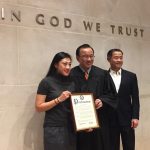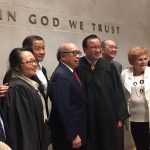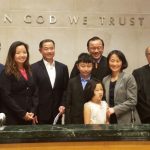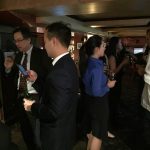AABANY CONGRATULATES HONORABLE PHILLIP HOM ON HIS INDUCTION TO NEW YORK CIVIL COURT
FOR IMMEDIATE RELEASE
NEW YORK, NEW YORK – December 15, 2017.
The Asian American Bar Association of New York (AABANY) congratulates the
Honorable Phillip Hom on his induction to the Civil Court in Queens
County.
A native New
Yorker and alumnus of SUNY Binghamton, Judge
Hom began his legal career in 1997 as an Agency Attorney for the New York City
Human Resources Administration. At that
time, he also worked on John Liu’s campaign for New York City Council. After John Liu’s appointment as Council
Member in 2001, Judge Hom served as his Chief of Staff. Judge Hom was appointed Assistant Director
and Legislative Counsel for the New York City Council in 2005, serving as
Council Member Liu’s main liaison to Community Boards 7 and 11 in Queens. After John Liu’s appointment as New York City
Comptroller, Judge Hom served as Deputy General Counsel in the Comptroller’s
Office in 2011.
Judge Hom was
active in APA matters in college and law school, and has promoted prominent APA
elected officials during his career. Judge
Hom was involved in the campaigns of Ellen Young, the first Asian American
woman elected to the New York State Assembly, and Ron Kim, who later became the
first Korean American elected to state-wide office in New York. As a judicial
delegate in Manhattan in the late 1990s and early 2000s, Judge Hom was instrumental
in then-Civil Court Judge Doris Ling-Cohan becoming a New York County Supreme
Court Justice. In 2014 Judge Hom joined
Windels Marx Lane & Mittendorf, LLP as Special Counsel.
“AABANY is
proud to recognize Judge Hom as a longstanding advocate for the Asian Pacific American
community,” states AABANY President Dwight Yoo. “We were delighted to take part
in his induction ceremony and to have the honor of robing him after he was
sworn in by Presiding Justice Randall T. Eng. We commend Judge Hom for serving
the public interest and the community and wish him continued success in making
a positive impact as a judge in the Civil Court in Queens County.”
For more information, please contact Yang
Chen, AABANY Executive Director, at (212) 332-2478, or direct any inquiries to main@aabany.org.
The Asian American Bar Association of New
York is a professional membership organization of attorneys concerned with
issues affecting the Asian Pacific American community. Incorporated in 1989,
AABANY seeks not only to encourage the professional growth of its members but also
to advocate for the Asian Pacific American community as a whole. AABANY is a
New York regional affiliate of the National Asian Pacific American Bar Association
(NAPABA).
Additional information about AABANY is available at www.aabany.orgFollow our blog at www.blog.aabany.org. Follow us on Twitter at www.twitter.com/aabany. Find us on Facebook at www.facebook.com/aabany
Interpreting Justice: Progress and Challenges on Language Access, An Asian Pacific American Perspective 2017
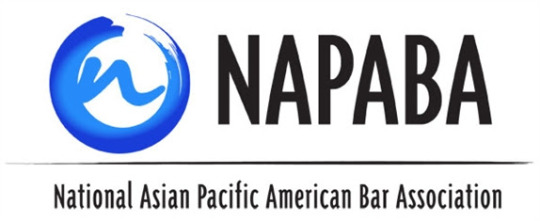
For Immediate Release
Dec. 14, 2017
Download a copy of “Interpreting Injustice.”
WASHINGTON — At a briefing on Capitol Hill, the National Asian Pacific American Bar Association (NAPABA) released “Interpreting Justice: Progress and Challenges in Language Access,” a report on language access for Asian Pacific Americans with limited English proficiency (LEP).
“Interpreting Justice” provides recommendations on policies, strategies, and best practices for legal, government, and community stakeholders to further diminish barriers to language access services for Asian Pacific Americans. “Interpreting Justice” finds that while overall progress has been made in the past 10 years, LEP individuals continue to struggle with limitations on languages interpreted, costs of interpretation, inconsistent interpreter quality, insufficient language assistance inside and outside of the courtroom, and a lack of translated written materials.
“This important report demonstrates the progress federal and state courts and agencies have made in the past decade, but underscores the continued need to improve language access services for the Asian Pacific American communities all over the country,” said NAPABA President Pankit J. Doshi. “NAPABA’s language access report, ‘Interpreting Justice,’ provides an updated picture on how the federal and state courts and agencies accommodate for the fastest growing population in the United States, Asian Pacific Americans.”
The diverse array of languages and dialects, particularly among Asian and Pacific Islander Americans, presents great challenges to ensure quality interpretation in both federal and state courts.“Interpreting Justice” recommends improving rules and standards for the use of interpreters, creating and providing translations of vital documents, and prioritizing appropriate training and compensation to maintain a pool of highly qualified interpreters.
Access for people with limited English proficiency in state courts progressed in the last decade, but access still varies greatly by state. More state courts and agencies have adopted language access plans or require certified interpreters, but states remain inconsistent with compliance with language access requirements. Much of the progress state and local agencies achieved for LEP individuals was the result of collaboration with advocates and community stakeholders.
NAPABA’s report also recognizes funding for language access as one of the largest barriers for LEP individuals and programs designed for LEP individuals. Federal budget cuts and the lack of awareness of language services for the LEP community creates a required increased emphasis on pursuing other forms or channels of funding, often stretching organizational capacity. NAPABA’s report recommends a number of feasible measures to counteract the underfunding.
“Interpreting Justice” builds on the work NAPABA started in 2007 with its groundbreaking report, “The State of Language Access for Asian Pacific Americans,” a culmination of NAPABA’s longstanding commitment to advance equal access to justice for Asian Pacific Americans with limited English proficiency (LEP) and widely used in creating new national standards on language access in the courts.
To access the full report, click here.
The report is a project of the NAPABA Research Institute led by the NAPABA Pro Bono and Community Service Committee. The report was released during a Congressional briefing in collaboration with the Congressional Asian Pacific American Caucus, featuring remarks delivered by Congresswoman Grace Meng (N.Y.–6), held in conjunction with the NAPABA Convention in Washington, D.C.
For more information, the media may contact Brett Schuster, NAPABA communications manager, 202-775-9555, bschuster@napaba.org. Questions about the 2017 report may be sent to Oriene Shin at 202-775-9555, or at oshin@napaba.org.
The National Asian Pacific American Bar Association (NAPABA) is the national association of Asian Pacific American attorneys, judges, law professors, and law students. NAPABA represents the interests of almost 50,000 attorneys and over 80 national, state, and local Asian Pacific American bar associations. Its members include solo practitioners, large firm lawyers, corporate counsel, legal services and non-profit attorneys, and lawyers serving at all levels of government.
NAPABA continues to be a leader in addressing civil rights issues confronting Asian Pacific American communities. Through its national network of committees and affiliates, NAPABA provides a strong voice for increased diversity of the federal and state judiciaries, advocates for equal opportunity in the workplace, works to eliminate hate crimes and anti-immigrant sentiment, and promotes the professional development of people of color in the legal profession.
To learn more about NAPABA, visit www.napaba.org, like us on Facebook, and follow us on Twitter(@NAPABA).
NAPABA Celebrates Confirmation of James Ho to U.S. Court of Appeals for the Fifth Circuit
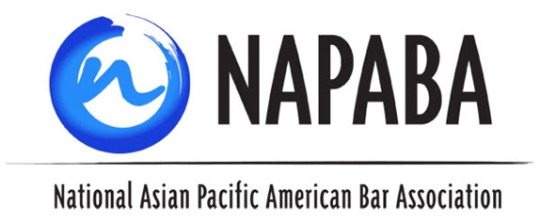
For Immediate Release
Dec. 14, 2017
WASHINGTON — Today, the United States Senate voted to confirm James C. Ho as a judge on the U.S. Court of Appeals for the Fifth Circuit. Ho is the first Asian Pacific American to serve on the Fifth Circuit and the sixth active Asian Pacific American federal appellate judge.
“James Ho is nationally recognized for his legal acumen and we congratulate him on his historic confirmation,” said Pankit J. Doshi, president of the National Asian Pacific American Bar Association (NAPABA). “Widely respected throughout NAPABA for his leadership and mentorship, we congratulate him on his confirmation. It is fitting that he continues to break barriers on behalf of the community as the first Asian Pacific American to serve on the U.S. Court of Appeals for the Fifth Circuit.”
Ho is the co-chair of the Appellate and Constitutional Law practice group at the law firm of Gibson Dunn & Crutcher. He has presented over 45 oral arguments in federal and state courts nationwide, including 16 arguments before the Fifth Circuit. He has argued and won cases before both the U.S. Supreme Court and the entire Fifth Circuit en banc.
Throughout Ho’s career, he has had extensive experience in all three branches of government: as former chief counsel for Senator John Cornyn, as an appointee at the U.S. Department of Justice, and as a law clerk for Justice Clarence Thomas of the U.S. Supreme Court and Judge Jerry E. Smith of the U.S. Court of Appeals for the Fifth Circuit. Most recently, he was the first Asian Pacific American ever appointed to serve as the solicitor general of Texas, the state’s chief appellate and Supreme Court litigator.
Ho is an active member of the Asian Pacific American community. He is co-chair of the NAPABA Judiciary & Executive Nominations & Appointments Committee, and he has written and spoken on numerous occasions about the role of Asian Pacific Americans in the law.
Ho has been recognized for his leadership and honored by organizations throughout the Asian Pacific American community, both nationally and in Texas, including the President’s Award from NAPABA, the Award for Outstanding Contributions to Asian Pacific American Leadership from the Conference on Asian Pacific American Leadership, the Justice David Wellington Chew Award from the Asian Pacific Interest Section of the State Bar of Texas, the Community Leader Award from the Dallas Asian American Bar Association, the Award for Outstanding Contributions in Law from the Greater Dallas Asian American Chamber of Commerce, and the Outstanding Achievement Award from the SMU Asian Pacific American Law Students Association.
NAPABA is proud to have supported James Ho during his nomination process. We thank President Trump for nominating him and Senators Cornyn and Ted Cruz of Texas for recommending him to the White House.
For more information, the media may contact Brett Schuster, NAPABA communications manager, 202-775-9555, bschuster@napaba.org.
The National Asian Pacific American Bar Association (NAPABA) is the national association of Asian Pacific American attorneys, judges, law professors, and law students. NAPABA represents the interests of almost 50,000 attorneys and over 80 national, state, and local Asian Pacific American bar associations. Its members include solo practitioners, large firm lawyers, corporate counsel, legal services and non-profit attorneys, and lawyers serving at all levels of government.NAPABA continues to be a leader in addressing civil rights issues confronting Asian Pacific American communities. Through its national network of committees and affiliates, NAPABA provides a strong voice for increased diversity of the federal and state judiciaries, advocates for equal opportunity in the workplace, works to eliminate hate crimes and anti-immigrant sentiment, and promotes the professional development of people of color in the legal profession.
To learn more about NAPABA, visit www.napaba.org, like us on Facebook, and follow us on Twitter(@NAPABA).









